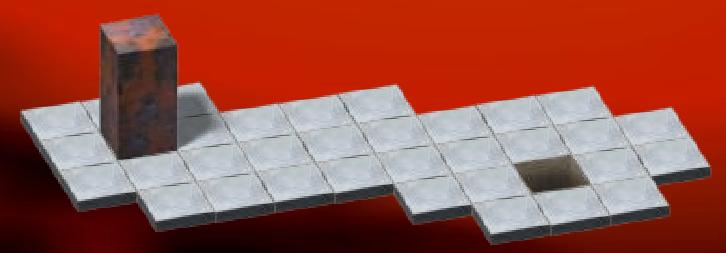|
Language:
Bloxorz I
Description Little Tom loves playing games. One day he downloads a little computer game called 'Bloxorz' which makes him excited. It's a game about rolling a box to a specific position on a special plane. Precisely, the plane, which is composed of several unit cells, is a rectangle shaped area. And the box, consisting of two perfectly aligned unit cube, may either lies down and occupies two neighbouring cells or stands up and occupies one single cell. One may move the box by picking one of the four edges of the box on the ground and rolling the box 90 degrees around that edge, which is counted as one move. There are three kinds of cells, rigid cells, easily broken cells and empty cells. A rigid cell can support full weight of the box, so it can be either one of the two cells that the box lies on or the cell that the box fully stands on. A easily broken cells can only support half the weight of the box, so it cannot be the only cell that the box stands on. An empty cell cannot support anything, so there cannot be any part of the box on that cell. The target of the game is to roll the box standing onto the only target cell on the plane with minimum moves.  The box stands on a single cell  The box lies on two neighbouring cells, horizontally  The box lies on two neighbouring cells, vertically After Little Tom passes several stages of the game, he finds it much harder than he expected. So he turns to your help. Input Input contains multiple test cases. Each test case is one single stage of the game. It starts with two integers R and C(3 ≤ R, C ≤ 500) which stands for number of rows and columns of the plane. That follows the plane, which contains R lines and C characters for each line, with 'O' (Oh) for target cell, 'X' for initial position of the box, '.' for a rigid cell, '#' for a empty cell and 'E' for a easily broken cell. A test cases starts with two zeros ends the input. It guarantees that
Output For each test cases output one line with the minimum number of moves or "Impossible" (without quote) when there's no way to achieve the target cell. Sample Input 7 7 ####### #..X### #..##O# #....E# #....E# #.....# ####### 0 0 Sample Output 10 Source
POJ Monthly--2007.08.05, Rainer
|
题意就不详细说了,去这里玩一下就知道了戳我玩游戏。还是非常好玩的~
思路:Move函数写得非常蛋疼,我是硬来的,一定要细心。
代码:
#include <iostream>
#include <functional>
#include <cstdio>
#include <cstring>
#include <algorithm>
#include <cmath>
#include <string>
#include <map>
#include <stack>
#include <vector>
#include <set>
#include <queue>
#pragma comment (linker,"/STACK:102400000,102400000")
#define pi acos(-1.0)
#define eps 1e-6
#define lson rt<<1,l,mid
#define rson rt<<1|1,mid+1,r
#define FRE(i,a,b) for(i = a; i <= b; i++)
#define FREE(i,a,b) for(i = a; i >= b; i--)
#define FRL(i,a,b) for(i = a; i < b; i++)
#define FRLL(i,a,b) for(i = a; i > b; i--)
#define mem(t, v) memset ((t) , v, sizeof(t))
#define sf(n) scanf("%d", &n)
#define sff(a,b) scanf("%d %d", &a, &b)
#define sfff(a,b,c) scanf("%d %d %d", &a, &b, &c)
#define pf printf
#define DBG pf("Hi
")
typedef long long ll;
using namespace std;
#define INF 0x3f3f3f3f
#define mod 1000000009
const int maxn = 550;
const int MAXN = 2005;
const int MAXM = 200010;
const int N = 1005;
struct Node
{
int state; //0表示立着 1表示横着 2表示竖着
int x1,y1,x2,y2;
int step;
};
int n,m;
int ex,ey;
char mp[maxn][maxn];
int dir[4][2]={0,-1,0,1,-1,0,1,0};
bool vis[3][maxn][maxn];
int pos[5];
bool isok(int x,int y)
{
if (x>=0&&x<n&&y>=0&&y<m&&mp[x][y]!='#') return true;
return false;
}
bool Move(int x,int y,int d,Node &now)
{
if (now.state==0)
{
now.x1=x+dir[d][0]; now.y1=y+dir[d][1];
now.x2=x+2*dir[d][0]; now.y2=y+2*dir[d][1];
if (d==0||d==2) { //始终保持横着的左边一个为主块。竖着的上面一个为主块
swap(now.x1,now.x2);
swap(now.y1,now.y2);
}
if (d<2) now.state=1;
else now.state=2;
if (isok(now.x1,now.y1)&&isok(now.x2,now.y2)&&!vis[now.state][now.x1][now.y1])
return true;
}
else if (now.state==1)
{
if (d<2){
now.x1=x+dir[d][0]; now.y1=y+dir[d][1];
if (d==1) now.x1=now.x1+dir[d][0] , now.y1=now.y1+dir[d][1];
now.state=0;
if (isok(now.x1,now.y1)&&mp[now.x1][now.y1]!='E'&&!vis[now.state][now.x1][now.y1])
return true;
}
else
{
now.x1=x+dir[d][0]; now.y1=y+dir[d][1];
now.x2=now.x1; now.y2=now.y1+1;
if (isok(now.x1,now.y1)&&isok(now.x2,now.y2)&&!vis[now.state][now.x1][now.y1])
return true;
}
}
else
{
if (d>1){
now.x1=x+dir[d][0]; now.y1=y+dir[d][1];
if (d==3) now.x1=now.x1+dir[d][0] , now.y1=now.y1+dir[d][1];
now.state=0;
if (isok(now.x1,now.y1)&&mp[now.x1][now.y1]!='E'&&!vis[now.state][now.x1][now.y1])
return true;
}
else
{
now.x1=x+dir[d][0]; now.y1=y+dir[d][1];
now.x2=now.x1+1; now.y2=now.y1;
if (isok(now.x1,now.y1)&&isok(now.x2,now.y2)&&!vis[now.state][now.x1][now.y1])
return true;
}
}
return false;
}
int bfs(int nn)
{
Node st,now;
memset(vis,false,sizeof(vis));
if (nn<3)
{
st.x1=pos[0];
st.y1=pos[1];
st.state=0;
}
else
{
st.x1=pos[0]; st.y1=pos[1];
st.x2=pos[2]; st.y2=pos[3];
if (st.x1==st.x2) st.state=1;
else st.state=2;
}
st.step=0;
vis[st.state][st.x1][st.y1]=true;
queue<Node>Q;
Q.push(st);
while (!Q.empty())
{
st=Q.front();Q.pop();
if (st.state==0&&st.x1==ex&&st.y1==ey)
return st.step;
// printf("
");
// printf("=====================
");
for (int i=0;i<4;i++)
{
now.state=st.state;
if (Move(st.x1,st.y1,i,now))
{
// printf("%d %d %d
",now.state,now.x1,now.y1);
vis[now.state][now.x1][now.y1]=true;
now.step=st.step+1;
Q.push(now);
}
}
}
return -1;
}
int main()
{
#ifndef ONLINE_JUDGE
freopen("C:/Users/lyf/Desktop/IN.txt","r",stdin);
#endif
int i,j,num;
while (scanf("%d%d",&n,&m))
{
if (n==0&&m==0) break;
num=0;
for (i=0;i<n;i++)
{
scanf("%s",mp[i]);
for (j=0;j<m;j++)
{
if (mp[i][j]=='X')
{
pos[num++]=i;
pos[num++]=j;
}
if (mp[i][j]=='O')
{
ex=i;ey=j;
}
}
}
int ans=bfs(num);
if (ans==-1) printf("Impossible
");
else printf("%d
",ans);
}
return 0;
}